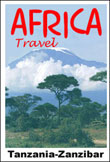|
|
 . . .. .. . . .. .. ........ |
|
|
|
World Tourism
Organization Regional Seminar held in Tanzania The tourism
industry is more important to the Least Developed
Countries in particular, because it is the only
sector in which until now these countries have
comparative advantages. With the constant fall of
prices of traditional products in the world market,
our strength greatly hinges on this sector. It is
encouraging to note that most African countries
have made tourism a priority and committed
resources to create conducive environment for its
growth. Statistics indicate that in 2002, Africa
Region showed an average annual growth rate of 5%
in tourism arrivals. According to WTO projections,
Africa will witness the sector grow four fold
between 1995 and 2020. With the diversity of
tourism products in our region, proper planning and
political will, Africa stands to benefit greatly
from tourism. Iam sure that during the course of
this Seminar, these positions will be further
elaborated by experts. Coming back to the
national scene, tourism plays a vital role in
Tanzania's economic development and it is one of
the major sources of foreign exchange earnings. The
sector currently accounts for 16% of the GDP and
nearly 25% of total foreign exchange. It also
directly supports an estimated 198,000 jobs.
Tourist arrivals have also been growing steadily
over the past ten years. Between 1994 and 2003,
tourist arrivals more than doubled from 261,595 in
1994 to 576,198 in 2003. In the same period Foreign
exchange receipts increased from US$ 192.10 million
to US$731 million an increase of more than three
fold The Tanzania
Development Vision 2025 envisages transforming the
economy from a low productivity agricultural
economy to a semi-industrialised country. The
vision also aims at alleviating poverty and
improving the livelihood of the Tanzanians, by
providing them with education, health care, good
living environment, peace and unity. This seminar is
being held at the opportune time, the time, when
the Government is putting final touches on the
Poverty Reduction Strategy II (PRS II) review
process. The PRS II key objectives are to increase
the economic growth and reduce income poverty,
improve people's livelihood and social welfare,
which also implies brooding sect oral coverage and
finally enhance good governance and
accountability In order to achieve
the above-mentioned objectives, several strategies
have been put in place. Sustainable Tourism
Development has been one of the strategies being
given special emphasis by the Government as a means
towards poverty alleviation; with the understanding
that, Sustainable Tourism Development addresses
needs of the present without compromising the
ability of the future generations to meet their
needs. As part of the
strategy, the sector policies emphasize active
community involvement in sustainable utilization of
natural and cultural resources. It is in this
spirit for example, that 25% of revenue accrued
mainly from hunting activities in Game Reserves is
ploughed back to respective villages surrounding
the reserves community projects. Ngorongoro
Conservation Area Authority and Tanzania National
Parks on the other hand have a programme known as
good neighborliness (Ujirani Mwema). In this
programme, local people are involved in
conservation of natural resources and environment
in the protected areas and benefit from tourism
activities taking place in their areas in form of
support to community projects. In the period of
three years from 1999 to 2001 for example, TANAPA
spent a total of Tsh 1,030,901,292 (US$
1,288,626.62) as a direct contribution to local
communities projects. In order to broaden
community participation in this area and benefit
sharing, a special programme of Wildlife Management
Areas (WMAs) is being introduced which will make
communities in the designated areas also benefit in
an organized way. In 1996, the
government of Tanzania in collaboration with SNV, a
Non Governmental Organisation based in the
Netherlands, initiated a pilot project on Cultural
Tourism whose aim was to establish a framework that
could promote Cultural tourism where local people
could benefit directly. By the end of 2001,
a total of 20 tourism modules were operational in
the North-Eastern areas of Tanzania. In the same
year 23,827 tourists visited the modules while a
total of Tsh 186,466,000 was obtained as income to
the modules. Out of this amount, Tsh. 121,202,000
was direct benefit to individuals and Tsh
65,263,100 went to the Village Development Fund
(VDF) Cultural tourism
has been more extensively developed in several
countries represented in this seminar than in
Tanzania. We feel that given the size of this
country and its cultural diversity, further
development is possible with resources available
but with more exchange of experiences which this
seminar will make possible. Expansion in this
area will provide further opportunities for
addressing poverty with resources available in many
communities. I have been
informed that the objective of this seminar is to
identify tourism potentials and find ways through
which Sustainable Tourism Development can impact on
our war against poverty. It is my expectation
that by the end of this three-days seminar, you
will be able to come up with imprementable
recommendations on how best we can develop
sustainable tourism and use the benefits accrued
from it to alleviate poverty among our
people. Most of our people live in the rural
areas where the District Authorities have the
easiest and best access. The challenge
therefore is how to empower the Districts to share
with us the concerns and become the effective
promoter of appropriate cultural and Eco tourism
project, which address poverty reduction. It is my
hope that you will make use of this opportunity to
share experiences and make contacts for future
networking. Seminar
participants were hosted on a field trip sponsored
by Ngorongoro Conservation Area Authority for
co-sponsoring the field trip to the world famous
Ngorongoro Crater and Tanzania National
Parks. More
information, email: Karentravel@aol.com |
